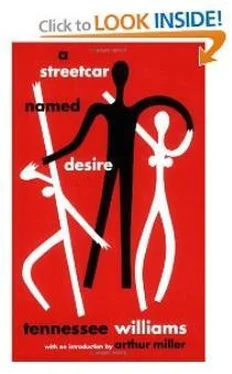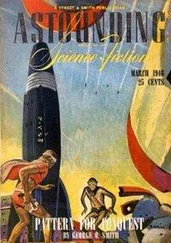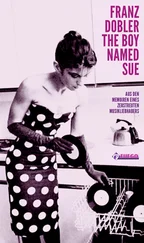A Streetcar Named Desire
by
Tennessee Williams
And so it was I entered the broken world
To trace the visionary company of love, its voice
An instant in the wind (I know not whither hurled)
But not for long to hold each desperate choice
"The Broken Tower" by Hart Crane
An Introduction by the Author
On A Streetcar Named Success by Tennessee Williams
(Copyright, 1947, by The New York Times)
(This essay appeared in The New York Times Drama Section, November 30, 1947--four days before the New York opening of A Streetcar Named Desire.)
Sometime this month I will observe the third anniversary of the Chicago opening of "The Glass Menagerie," an event which terminated one part of my life and began another about as different in all external circumstances as could be well imagined. I was snatched out of virtual oblivion and thrust into sudden prominence, and from the precarious tenancy of furnished rooms about the country I was removed to a suite in a first-class Manhattan hotel. My experience was not unique. Success has often come that abruptly into the lives of Americans.
No, my experience was not exceptional, but neither was it quite ordinary, and if you are willing to accept the somewhat eclectic proposition that I had not been writing with such an experience in mind--and many people are not willing to believe that a playwright is interested in anything but popular success--there may be some point in comparing the two estates.
The sort of life which I had had previous to this popular success was one that required endurance, a life of clawing and scratching along a sheer surface and holding on tight with raw fingers to every inch of rock higher than the one caught hold of before, but it was a good life because it was the sort of life for which the human organism is created. I was not aware of how much vital energy had gone into this struggle until the struggle was removed. I was out on a level plateau with my arms still thrashing and my lungs still grabbing at air that no longer resisted. This was security at last.
I sat down and looked about me and was suddenly very depressed. I thought to myself, this is just a period of adjustment. Tomorrow morning I will wake up in this first-class hotel suite above the discreet hum of an East Side boulevard and I will appreciate its elegance and luxuriate in its comforts and know that I have arrived at our American plan of Olympus. Tomorrow morning when I look at the green satin sofa I will fall in love with it. It is only temporarily that the green satin looks like slime on stagnant water. But in the morning the inoffensive little sofa looked more revolting than the night before and I was already getting too fat for the $125 suit which a fashionable acquaintance had selected for me. In the suite things began to break accidentally. An arm came off the sofa. Cigarette burns appeared on the polished surfaces of the furniture. Windows were left open and a rainstorm flooded the suite. But the maid always put it straight and the patience of the management was inexhaustible. Late parties could not offend them seriously. Nothing short of a demolition bomb seemed to bother my neighbors. I lived on room-service. But in this, too, there was a disenchantment. Sometime between the moment when I ordered dinner over the 'phone and when it was rolled into my living room like a corpse on a rubber-wheeled table, I lost all interest in it. Once I ordered a sirioin steak and a chocolate sundae, but everything was so cunningly disguised on the table that I mistook the chocolate sauce for gravy and poured it over the sirloin steak.
Of course all this was the more trivial aspect of a spiritual dislocation that began to manifest itself in far more disturbing ways. I soon found myself becoming indifferent to people. A well of cynicism rose in me. Conversations all sounded like they had been recorded years ago and were being played back on a turntable. Sincerity and kindliness seemed to have gone out of my friends' voices. I suspected them of hypocrisy. I stopped calling them, stopped seeing them. I was impatient of what I took to be inane flattery.
I got so sick of hearing people say, "I loved your play!" that I could not say thank you any more. I choked on the words and turned rudely away from the usually sincere person. I no longer felt any pride in the play itself but began to dislike it, probably because I felt too lifeless inside ever to create another.
I was walking around dead in my shoes, and I knew it but there was no one I knew or trusted sufficiently, at that time, to take him aside and tell him what was the matter. This curious condition persisted about three months, tll late spring, when I decided to have another eye operation, mainly because of the excuse it gave me to withdraw from the world behind a gauze mask. It was my fourth eye operation, and perhaps I should explain that I had been afflicted for about five years with a cataract on my left eye which required a series of needling operations and finally an operation on the muscle of the eye. (The eye is still in my head. So much for that.) Well, the gauze mask served a purpose. While I was resting in the hospital the friends whom I had neglected or affronted in one way or another began to call on me and now that I was in pain and darkness, their voices seemed to have changed, or rather that unpleasant mutation which I had suspected earlier in the season had now disappeared and they sounded now as they used to sound in the lamented days of my obscurity. Once more they were sincere and kindly voices with the ring of truth in them.
When the gauze mask was removed I found myself in a readjusted world. I checked out of the handsome suite at the first-class hotel, packed my papers and a few incidental belongings and left for Mexico, an elemental country where you can quickly forget the false dignities and conceits imposed by success, a country where vagrants innocent as children curl up to sleep on the pavements and human voices, especially when their language is not familiar to the ear, are soft as birds'. My public self, that artifice of mirrors, did not exist here and so my natural being was resumed.
Then, as a final act of restoration, I settled for a while at Chapala to work on a play called "The Poker Night," which later became "A Streetcar Named Desire." It is only in his work that an artist can find reality and satisfaction, for the actual world is less intense than the world of his invention and consequently his life, without recourse to violent disorder, does not seem very substantial. The right condition for him is that in which his work is not only convenient but unavoidable. This is an over-simplification. One does not escape that easily from the seductions of an effete way of life. You cannot arbitrarily say to yourself, I will now continue my life as it was before this thing. Success happened to me. But once you fully apprehend the vacuity of a life without struggle you are equipped with the basic means of salvation. Once you know this is true, that the heart of man, his body and his brain, are forged in a white-hot furnace for the purpose of conflict (the struggle of creation) and that with the conflict removed, the man is a sword cutting daisies, that not privation but luxury is the wolf at the door and that the fangs of this wolf are all the little vanities and conceits and laxities that Success is heir to--why, then with this knowledge you are at least in a position of knowing where danger lies.
You know, then, that the public Somebody you are when you "have a name" is a fiction created with mirrors and that the only somebody worth being is the solitary and unseen you that existed from your first breath and which is the sum of your actions and so is constantly in a state of becoming under your own volition--and knowing these things, you can even survive the catastrophe of Success!
Читать дальше












